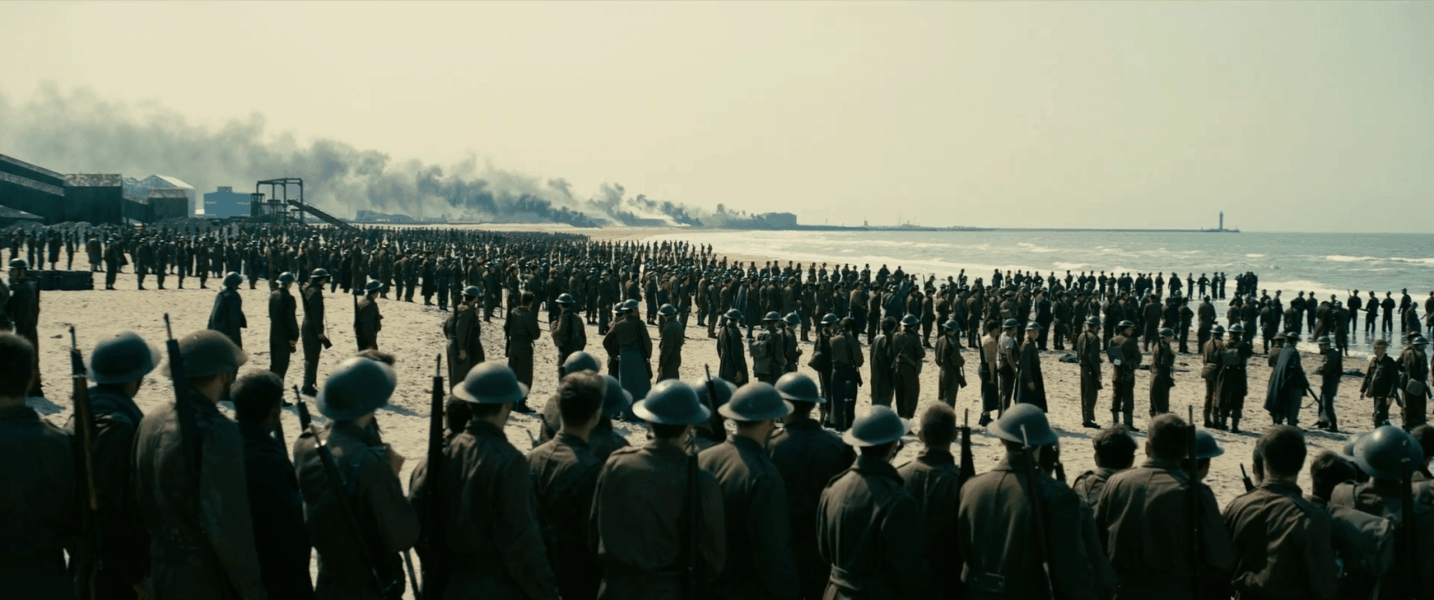Approximately 400 thousand British, Belgian, Dutch and French soldiers were trapped in Dunkirk in May 1940. In this film we are witnessing the rescuing of the British troops. A nearly impossible task since they are constantly being attacked from air, sea and ground.
With Dunkirk, Christopher Nolan has reached new heights of filmmaking while employing a whole new set of techniques. Gone is the dialogue and one-liners that we associate with Hollywood. No famous Hollywood stars (with a couple of exceptions) are present either. The director focuses on the anonymity of a few people, without revealing their names for the most part. And if you expect to watch a war film like Saving Private Ryan you will be disappointed. According to the IMDb trivia, Nolan himself has said that he didn’t wish Dunkirk to have the tension he felt when watching Spielberg’s film.
Of course, some of Nolan’s themes are still there, like the repetition of time. The film starts in the middle of the action, with an escape scene through the alleys of Dunkirk, and from then on follows the main plot: three different storylines warped in time and inspired by the four elements. The air storyline takes place in an hour, the sea in a week, and the ground in just a day, thus running into each other.
This is not a war film, but rather a thriller, as the director has described it. In Dunkirk the main enemy is not the German troops (we never see them closely, never hear them talk). The enemy seems not to have any nationality because the enemy is time: there is constant movement in the film and everyone seems to race against time (the constant ticking of the clock, as captured in the soundtrack, never lets us forget this). Only by overcoming the present can death be beaten. And, by breaking through the barriers of time, and into infinity, humanity enters eternity as the ending of the film seems to suggest.
As for the actual plot, the brief summary before the review seems essential for those not familiar with the historical events that took place. Nolan is not interested in telling or retelling the historical facts. In fact, there is no need for storytelling at all, since all the action is happening right now. The three storylines seem to run in parallel, but Nolan decides to end each one independently of its stated duration, thus emphasising the cyclical infinity of time.
There is no point reviewing the director’s techniques in detail, but I should briefly mention the impressive use of the 70mm IMAX cameras that offer us some astonishing detail, even in panoramic shots. After all, Nolan has proven that he is a master of cinematic techniques. It’s no wonder that he has often been compared to Kubrick. Both directors seem obsessed with detail and show an impressive understanding of technique, often sacrificing emotion. But not here, for I believe that in Dunkirk the emotional effect is as refined as ever. There is no sign of melodrama, but what the viewer experiences is this: subtly controlled, understated emotion — a real feat for a war movie (even if typically it really shouldn’t be classified under this genre).

Many reviewers have concluded that this is Nolan’s best film to date. I have to agree. With Dunkirk Nolan seems to have found the missing ingredient: that of distilled (this is very nice yo use as a quote or in bold etc) emotion, which he offers here with virtuosic flair. There is this point in the film where the aggressive strings and menacing percussion of the soundtrack stop abruptly and we hear an arrangement of Nimrod. The effect is more than soothing for we, the viewers, can identify at last with something human, a familiar tune that seems to belong to our world. The use of sound in Dunkirk is, in fact, so effective that if someone had shown me the final minutes of the film, without telling me the name of the director, I’d have assumed that this was actually a Terrence Malick feature (with the latter’s characteristic voice-over and all). Such is the poetry Nolan creates in some parts.
All in all, Dunkirk is an excellent film. If Christopher Nolan carries on in the same vein, we can easily expect him to join the company of the elite directors.
The High Arts Review Silver








[…] could easily classify 1917 as a war film but what lies beneath it is a highly compact, philosophical essay on time, space and eternity. The […]